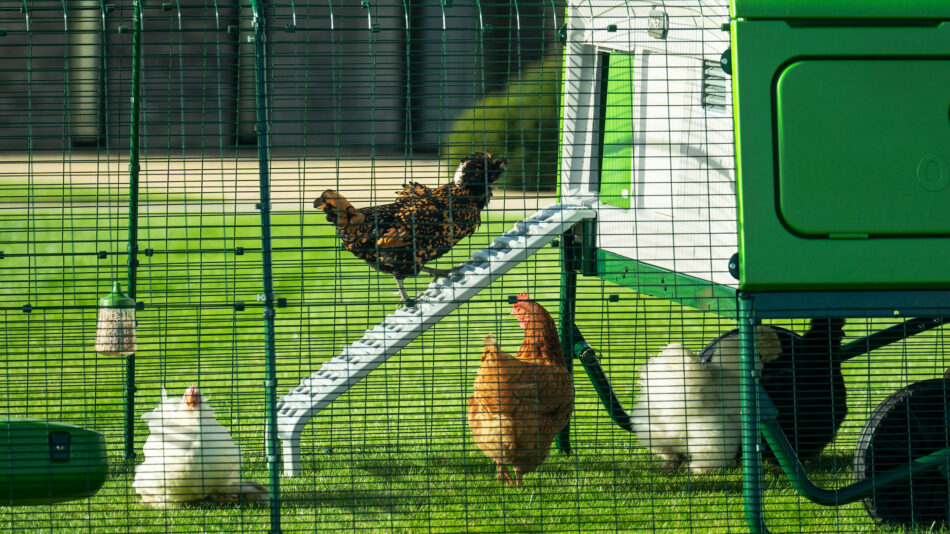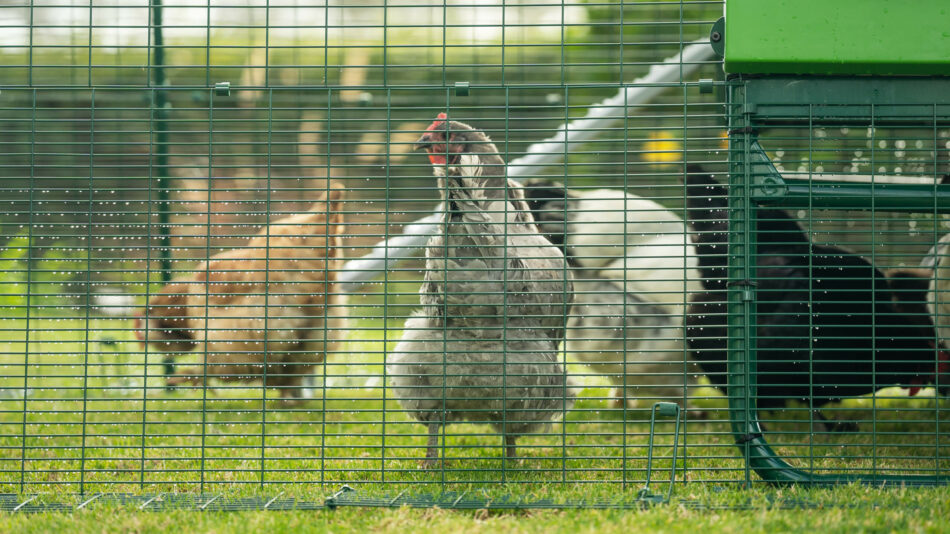How to keep rats away from your chicken coop
No one wants rats hanging around — much less around areas that you frequent. One of the most common questions we receive from people who are thinking about getting chickens is: will keeping chickens attract rats? The short answer is most likely, yes. But thankfully there are several things you can do to prevent unwanted visitors in the form of rodents – here’s our best tips on how to keep rats away from your chickens.
Risks that rats pose
You don’t have to have musophobia (the fear of mice and rats) to want to avoid seeing them. Wild rats aren’t a fun surprise to happen upon anywhere, but especially not when they can wreak havoc on your flock and their belongings. In addition to being generally unappealing and startling for both you and your flock, rats can:
- Carry diseases
- Gnaw their way through wood and plastic
- Raid nesting boxes for eggs
Rats will even go after young chicks for an easy meal. But, it’s important to note that rats aren’t attracted to your chickens — it’s their feed they’re really after. With this is in mind, here’s how to prevent attracting the attention of these ravenous rodents.
Store and dispense feed properly
Keeping your flock’s feed in airtight containers is the first step in preventing rats. Rats are clever and have an excellent sense of smell, so it’s vital that any feed containers have a good seal and made from thick material. They’re also patient and can learn routines quickly, so if you have rats that monitor your daily activity with your flock, they may learn where the feed is stored. Metal containers prevent rats from gnawing through to the feed they may have observed being stored there.
When you feed your chickens, make sure that your chicken feeders are elevated and deep enough that your hens don’t make a mess when they eat. Feeders with leftover food should be removed from the run each night to prevent opportunistic midnight snackers. Sweep or scoop up any dropped feed from the run floor, and store feeders in airtight containers.
Take care with treats
When you treat your chickens with scratch or other offerings, only toss what you’re confident they will eat by sundown. To avoid waste, feed scratch grains in chicken peck toys, and kitchen scraps in a Caddi Chicken Treat Holder. These can be removed easily at the end of the day, and help keep food from being scratched into the ground. Plus, eating treats this way provides an interesting and engaging angle for snack time that your hens will appreciate.
Collect eggs daily
Eggs are a tempting meal for rats, and if they aren’t collected regularly, they can draw rodents in. To prevent piquing rats’ interest, you’ll need to collect eggs every day. This is a good practice to maintain for several reasons, but if you’re worried about rats it’s a necessity. If for some reason you can’t collect eggs for the day, outfit your chicken coop with an automatic chicken coop door that will close at night when rats are the most active.
Employ deterrents
There are a few other things you can do to keep rats away from your chickens. Along with collecting their feed and eggs daily, you can take external measures to deter rodents. From other animals to 90s nostalgia, here are some recommendations for keeping rats at bay:
- Keep an outdoor cat around your chickens’ set up
- Hang reflective tape or CDs from strings around the run to catch the light and deter rats and other predators
- Wrap ¼ inch hardware cloth around the bottom of your chickens’ run, and bury it a couple of inches below the ground
- Set motion lights at ground level to be triggered by overnight rat raids
What not to do
When trying to avoid rats in the chicken run, there are a few things to avoid. Some of these measures can pose a risk to your flock, so be sure to never use these around your hens:
- Rat poison
- Sprays meant to deter rodents
- Mouse or rat traps (even humane traps)
Electric fencing can be placed around the perimeter of your chickens’ area to deter rats and other predators, but extreme caution should be exercised so that your chickens, other pets, or children don’t come into contact with it.
Omlet and your flock
Keeping chickens doesn’t have to come along with the potential for rodents. By keeping your flock in a strong hen house with an Autodoor, you’ll prevent rats from being tempted to infiltrate their coop. And, by serving treats in elevated chicken treat holders, you’ll reduce waste in the run for rats to feast on later. With these measures in place, you can enjoy tending to your flock without fear of rodents laying in wait.
This entry was posted in Chickens



15 replies on “How to keep rats away from your chicken coop”
What do you think about the chicken feeders with the step release? I am worried that hens could be harmed, but good way to keep food away from rats.
One of the main gripes I have w Omlet runs is that the holes in the mesh are too big as they allow rats to slip thru any of them. I even have squirrels getting thru the larger holes in the top parts of the run. A design flaw in my opinion
We were scared to use this feeder when first bought. The chicken learned extremely quickly to use it. No accidents at all. It’s brilliant.
I have two Grandpa’s feeders which are rat proof. The fact that my neighbours have some young cats helps of course.
I use them and the chucks all seem fine with them. Any new girls sometimes take a bit of getting used to them but they work it out eventually.
I have a treadle feeder and I wouldn’t go back to anything else. They quickly learn how to use it and it won’t cause them any harm.
We’ve got a step feeder and there’s been no problem with the girls getting hurt. Each new chook learns from the others
I have changed over to the feeders with the step release. Our girls took very little time to learn how to use them. There are several out there. I went with ones that have sides on the outside of the feeding trough. These reduce the feed being thrown out feeder as the girls feed. I also went for ones with the step being galvanised and solid rather than plastic. With the plastic step I was worried that our girls could get their claws caught in the holes. With the step being solid and galvanised it makes it really easy to clean. I have 2 feeders one with layers pellets and one with layers mash.( This is because I rescue ex caged hens. I bring the poorly ones home and nurse them back to full health.) One of my girls has a severe cross beak and finds layers pellets difficult to peck up. It took her and her fellow rescues a very short time to workout how to use the feeders. Just follow how they recommend to introduce them to your girls. I wouldn’t go back to an open feeder now.
I have kept hens for a large number of years, until now they were in a home made house, I felt the rats came in mainly for the warmth, they could not eat the hen food and apart from their hopper they were only given things like dandilions or vegetables and only in the early morning so nothing was left by the afternoon. The rats ate through wood, cement and metal, I love the Eglu and hope rats are a thing of the past.
We have one of these feeders and it’s great. Food stays dry a d rat free but it did take a couple of days for the girls to get used to it.
I use to use one, and the chickens were absolutely fine with it, but I did find that slugs could get in it, and I think they liked the darkness inside, and loved the food. I have now stopped using it, and bring the chicken food in at night
I found the only way to keep rats out was to use a metal treadle-operated feeder. Before we got that the rats were so brazen, we’d see a bottom hanging out of the Omlet feeder in broad daylight.
Now that they can’t access the chickens food they are no longer seen in the daytime.
We have one of these feeders and it absolutely solved our rat problem. The hens learn how to use it really quickly and it’s a great way to make sure they have food that’s safely covered!
step feeders work well, rats undermine them to get food the chickens scatter as they feed! but that gives me lots of fun with my airgun!! r.i.p mr/mrs rat.
El comments on step release feeder. We got one last year as we did have a problem with rats despite doing all we could to deter. It took the girl a couple of weeks to get it, but follow instructions and they’ll be fine. No more rodents! Can highly recommend.